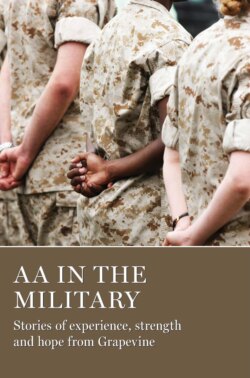Читать книгу AA in the Military - Группа авторов - Страница 8
На сайте Литреса книга снята с продажи.
CHAPTER ONE Duty Called
ОглавлениеThe early days: Grapevine provides soldiers a vital connection to AA during and after World War II
Alcoholics Anonymous was still a young Fellowship when World War II broke out. Hundreds of sober AA members in the United States and Canada would enter the armed forces, some with little sober time under their belts. They would be sent across North America and around the globe. This meant leaving behind friends and loved ones, hometowns and AA groups. Many in the Fellowship wondered how these members, with little or no access to meetings or other AAs, would be able to stay sober.
At this time, interest had already sparked in creating a newsletter with AA news and inspiration—and its potential value to our members in the military seemed enormous. This newsletter would become our beloved Grapevine, and for those in military service, their “meeting in print.” From the very first issue, Grapevine kept servicemen and women connected to the Fellowship and our program of recovery, as the stories in this opening chapter attest.
In an article titled “Lieutenant Rediscovers the Beauties of Easy Does It” from 1944, M.L., a Second Lieutenant stationed in an “out-of-the-way place,” Grapevine editors recognize “a cry for help.” M.L. wrote of feeling a “total loss” when off duty and being unable to find “a single soul here that speaks the same language.” After receiving her first issue of Grapevine, M.L. wrote in again: “Does that mean I’m to get it every month? It’s proving no end of help to me.”
Very early on, Grapevine also received letters from AAs struggling to adapt to the return to civilian life. In a department called “Mail Call for All AAs in the Armed Forces,” published in the 1940s, a member writing with the initials T.D.Y. alerted AAs back home that “reconversion” from military to civilian life for AA members is “especially difficult—and dangerous.” He also wrote “that application of the AA way of thinking will ease the transition for the veteran in many ways.”
In a story called “Far From the Customary Skies,” member R.H. of New York City wrote that he received his first issue of Grapevine in June of 1944. He was stationed overseas at the time and had only four months of sobriety. He wrote that he found “staying away from the first drink isn’t easy.” The arrival of Grapevine “changed all that for me,” he added. He said that each issue that followed was “concrete evidence that we weren’t forgotten.”
The program helped these men and women get and stay sober far from home. And our servicemen and women helped carry our message across the globe and showed how to achieve sobriety in the most extreme circumstances.
